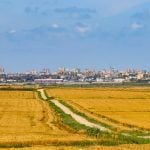THIS month our church denomination in Canada and the United States will decide whether to allow congregations the option of blessing same-sex unions.
The heated discussion has ranged all over the map. However, few have asked “whose question is it?”
At a meeting of world representatives of our church, an African woman said, “don’t force us to consider this question. We are burying several families a week from hunger and AIDS in our congregations. It’s taking all of our energy to deal with the enormous challenge of survival. If we have to divert our attention to same-sex blessings, no matter how important the issue may be to you, it will hamper our ability to deal with the stuff that is killing us.”
Read Also

Kochia has become a significant problem for Prairie farmers
As you travel through southern Saskatchewan and Alberta, particularly in areas challenged by dry growing conditions, the magnitude of the kochia problem is easy to see.
I wonder if that dynamic is at work in rural Canada too. Rural people show up in the opinion polls as being less supportive of same-sex marriage than urbanites.
This may be partly due to the higher average age in rural areas. Those polls show a huge gap between young adults (60 to 70 percent in favour) and retirees (60 to 70 percent opposed) on the question.
It may also be due to a lower percentage of gays and lesbians in rural areas, though accurate statistics are hard to come by.
However, I think there is more to it than age and demographics. A rural pastor told me about hosting a congregational discussion on the question. One fellow stood up and said, “if our church decides to marry homosexuals, I’m leaving.” Another member responded, “but what about Tom and Fred?” These are two local farmers that live together. Everyone knows they are gay though it isn’t mentioned much.
“What if they want to get married?”
“Well,” the first fellow replied gruffly, “that’d be up to them.”
Maybe rural resistance to same-sex marriage is not just a result of conservative values. Perhaps it is also a reaction to having rural social agendas set by distant urban interests. Folks on both sides of the issue have told me they resent having their community torn apart by questions that are pressing in other contexts but are not high priority for them.
After all, social relationships are the stuff of life in smaller communities. They determine one’s sense of self-worth, whether one will be given credit for spring planting, whether support can be raised for the new curling rink, and how one’s children will be treated on the school grounds. That “social capital” is not risked needlessly.
My sense is that rural folks are willing to risk division on the issues that are most deeply affecting their communities: the enormous stress caused by drought, flooding, mine closures, budworms and BSE; the loss of their youth to crystal meth and to the cities; grain marketing, water rights and ground and air pollution.
But fewer want to risk their relationships fighting over an issue that won’t much affect their community, no matter how it is settled.
Self-determination is not just about allowing a community to make its own decisions on a question.
It’s also about allowing it to decide which questions matter.
















